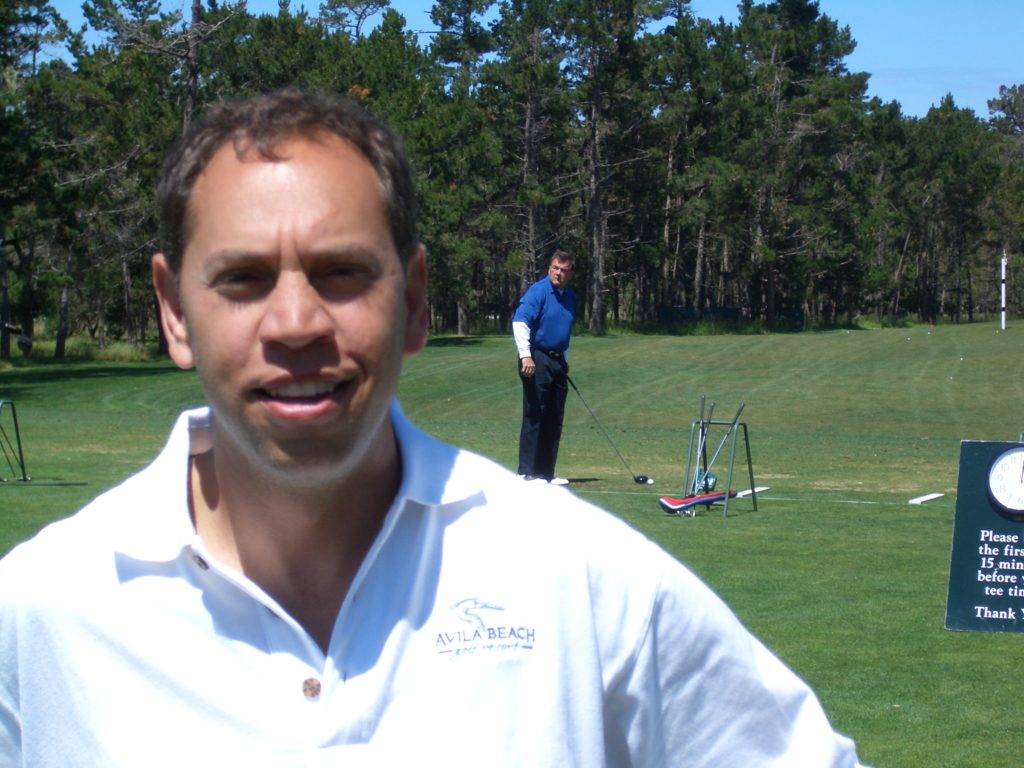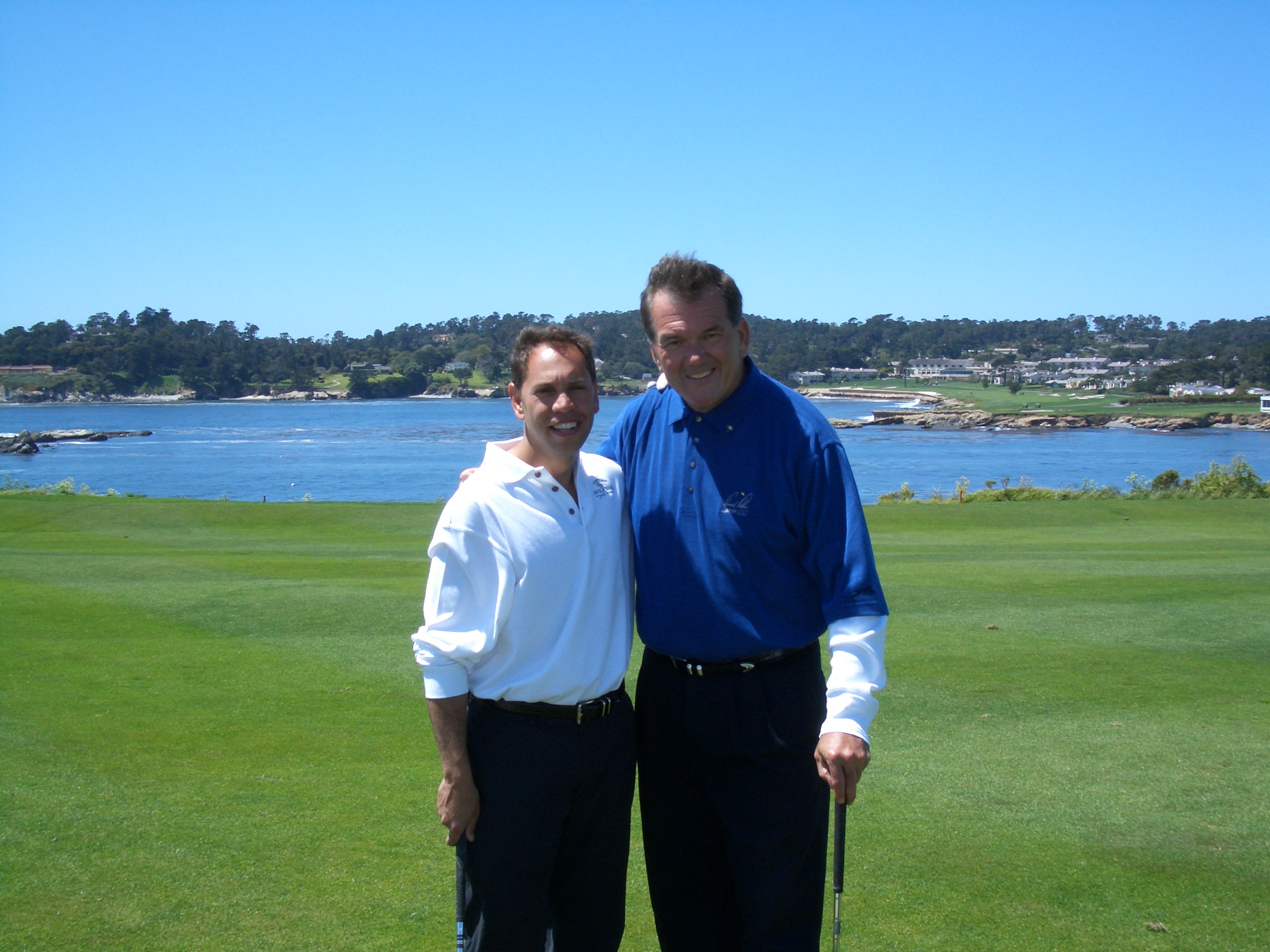A boxy white sedan that looked like it might be an official vehicle pulled up to the front of the circle-drive at Pebble Beach Golf Links. As I walked past it on my way to the pro shop, I identified the tall fella getting out of the backseat as Tom Ridge, the former Republican Governor of Pennsylvania and Secretary of Homeland Security.
I walked up to Ridge, thanked him for his service, then made a joke about my being the “enemy” — a Chicago guy who’d been managing Democratic Senate and House campaigns. Ridge belted out a friendly laugh, and then asked: “Are ya playin’ today?”
It was a crisp spring morning in 2005. I was in the middle of a two-week road trip through California. I’d pre-planned a few visits with old friends in L.A., San Francisco and Fresno, but I’d also mapped out some solo stops in San Diego, San Luis Obispo, Monterrey, and the wine country. I was 36 years old and at a career crossroads. I thought some quiet time driving up the Pacific Coast Highway might surface some clues.
I told Ridge that I’d called up the pro shop at 7 a.m. and that they’d hooked me up with a threesome teeing off at 11:30. Ridge laughed again and said: “Well, you’ve got a long day ahead of you — you’re playing with US!”
As we rode the shuttle together to the practice tee, Secretary Ridge asked me about my background. He also asked me to call him “Tom.”
I explained that for several years I’d worked as a TV news reporter in Iowa and California before becoming a civil rights advocate at the ADL. In 2000, I’d jumped into the world of politics.
I knew that Ridge had won a Bronze Star for Valor during the Vietnam War. What I didn’t know was that because he was in law school when he was drafted in 1969, he could have deferred his military service. Instead, he reported to Fort Dix and became a Sergeant fighting along the South China Sea. Twelve years later, he would become the first Vietnam Vet ever elected to the US Congress.
Ridge didn’t boast about any of this; he was completely genial and self-effacing. I knew that we had very different political views, but there was no question that I’d just met a gentleman with a world of life experience.

As we began swatting balls on the range, Tom told me that he’d started a consulting business since leaving his post at DHS. One of the guys we were going to play with worked for a reinsurance lobby that Tom was scheduled to address the next morning.
Before I knew it, I was asking the former governor questions that were a bit more personal. I was curious to know how he liked running a profit-driven enterprise after decades serving in elected or appointed office.
In a matter-of-fact-fashion, Tom said that consulting was fine. He wasn’t passionate about it, but he didn’t dislike it, either.
Perhaps it was because we’d struck up such an easy rapport, but I started to tell Tom more about the decisions I was contemplating.
He seemed genuinely interested and listened quietly as I explained that while I loved public service and had thought about running for office, I was feeling a creeping pressure to start making some real money. When Tom asked whether I actually needed more income, I shook my head no. I was unmarried and didn’t have any kids. That wasn’t the tension.
I explained that in the Chicago suburbs where I grew up, the ambition to build and grow a business was more or less the natural order. My own father had achieved great success in his sales career, which ultimately afforded me choices that he didn’t have as a young man.
As I redirected the conversation toward Tom’s experiences, he acknowledged that if he had left his 25-year government career at an earlier point, he almost certainly would have become a wealthier man. And that’s when I put the question straight to him:
“Y’know, Tom, it sounds like the professional path you chose was extremely rewarding. Is that true? Would you have done anything differently?”
Tom smiled and then looked down for a beat, almost as if he was reminiscing years of his career at the speed of light. Then he snapped back upright, looked straight at me, and said:
“Michael, I’ll tell ya: I wouldn’t have traded a single second. Not one second. If public service is in your heart to do, there is nothing better.”
Eureka.
Even if I hadn’t written that quote down in the journal I’d been keeping over those 13 days, there’s still not a word from Tom’s answer that I’d ever forget.
It’s not as if his opinion completely settled the matter for me at that moment. It was more like finding a big and timely clue in the middle of an investigation.
The rest of that day was sheer pleasure. Tom and I played a match; I gave him eight shots and ended up beating him for ten dollars. When he pushed a sawbuck toward me on our way to the clubhouse, I told him to keep it — that his advice was worth a lot more than that. Tom insisted, saying with a smile: “Fast pay makes fast friends.”
After I returned to Chicago, I was recruited to manage one of the most competitive congressional races in the country. After having worked for mostly long-shot candidates, I took the job. Our win that year was part of the historic 2006 Democratic takeover of both the House and the Senate. It was a night I will never forget.
Over the next 15 years, the public service path I paved included cofounding two college achievement nonprofits, steering two Chicago mayoral campaigns, launching a tech-journalism startup, authoring a book about fixing Congress, senior fellowships at think tanks in D.C. and Chicago — and a teaching position at Arizona State University.
Eventually, I would start a business that leveraged some of the experience and relationships I’d picked up along the way. But there’s no question that I always felt more fulfilled when the work I was doing was geared toward making a difference in other people’s lives.
I hadn’t thought about all of this until recently when I was invited to be a guest on a podcast called “Insights Through the Rear View Mirror.” I told the host, Jon Kramer, that I’d be glad to be on — with the disclaimer that I usually relied on my gut when it came to decision-making.
But the conversation we had on the podcast reminded me that at various points in my life, I did engage in some real soul-searching and that a big part of it was soliciting external feedback.
I later asked Jon for his opinion about the value of seeking others’ opinions within the framework of the decision-making process. He replied that the consideration of outside input is an absolute constant amongst all of the guests he’s interviewed. But the really interesting part of his answer was about who is giving the counsel:
“My personal experience with both my kids and my parents is that as a long term guide, they/we do not do as good a job giving direction as we are too…Alternatively, an outsider, somebody with less personal involvement, may be more valuable.”
This made perfect sense to me. And I’m sure it’s been a big part of the value I’ve derived from all of the advice I’ve received from people like Tom over the years.
Ironically, these days I’m on the other side of the table, as students and young professionals frequently ask me some of the same kinds of questions that I used to ponder.
I’m not saying that the internal conflict I was experiencing in 2005 magically disappeared for the next 15 years. Deciding the directions that you want your life to move in is a never-ending process that keeps unfolding for as long as the sun keeps rising.
But the more that we live, listen and learn, the more wisdom we accrue. And if we try our level best to apply that knowledge to navigating the twists and turns of our lives, then there really is no such thing as making a wrong decision.


